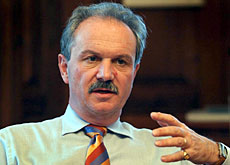Central bank sees upswing continuing

The head of the Swiss National Bank, Jean-Pierre Roth, says Switzerland's economy recovery will continue into next year and there is no threat of inflation.
He also rejected criticism from the business community and trades unions for the bank’s decision last month to raise key interest rates by a quarter of a percentage point.
In an interview with the “NZZ am Sonntag” newspaper, Roth said he was confident that economic growth would this year be around the two per cent mark.
He also believed that the labour market situation should improve over the coming quarters and, unlike a number of bank analysts, saw no danger of inflation.
NZZ am Sonntag: After the Swiss National Bank’s move a couple of weeks ago, the United States Federal Reserve Board has now increased interest rates. Did you have contact with Alan Greenspan (head of the Fed)?
Jean-Pierre Roth: (laughs) There are indeed common interests. The economy is moving practically everywhere around the world in the same way. The upswing is taking place generally in unison, led by the US and Asia. Europe only got going somewhat later. The various economic blocs at the same time must therefore correct their monetary policy from being quite expansive to become more moderate.
NZZ: Europe and Switzerland are limping a long way back when it comes to economic dynamism.
J-P.R.: There are naturally differences. The American economy has been heavily stimulated and the Asian economies, with all their economic force, have created much liquidity. Switzerland was strongly affected by the global investment crisis. We lowered interest rates earlier and more markedly than for example the European Central Bank. But now our widely diversified export economy is profiting from the worldwide recovery.
NZZ: Do you believe in a sustainable recovery of the Swiss economy?
J-P.R.: We believe that economic growth this year will be almost two per cent. Against the background of the previous weak years, this is certainly slim. But the positive development should be maintained in 2005.
NZZ: And the labour market?
J-P.R.: The turning point has been reached. We expect an improvement in the rate of employment over the next quarters.
NZZ: But the positive signals are coming from exports and less from the domestic market.
J-P.R.: That is correct. The positive impulses are coming from trade in exports and the domestic economy is lagging behind. But confidence in the recovery will force its way through to the domestic economy. But of course in the domestic sector we have considerable structural problems. They are not only in the public sector. We are also not efficient enough in service sectors such as tourism.
NZZ: The economic situation is improving. Pressure is therefore easing to restructure in the weak sectors to improve productivity.
J-P.R.: There is a danger that we will once again forget our homework to tackle the necessary structural reforms. But we should now seize the opportunity to promote economic growth in our country.
NZZ: But effective reforms have little chance politically.
J-P.R.: The government package aimed at stimulating the economy is naturally an absolute minimum for many economists. But I believe that we should now at least take this step, instead of setting our sights too high and then failing.
NZZ: Can you understand the harsh criticism of the interest rate rise from the Swiss Business Federation (economiesuisse) and the trade unions?
J-P.R.: If people talk of surprise at our interest rate move, they have lost sight of reality. The three-month rate was already on the rise before our decision. Long-term interest rates have also risen. The markets are waiting for a correction in the sense that we press down a little less on the accelerator pedal. We have done that. But we did not put our feet on the brakes! Our monetary policy remains expansive.
NZZ: When will the next interest rate moves be made?
J-P.R.: We have to normalise monetary policy when the economy normalises. We make our assessments every three months. The next time will be in September. What we will decide then is completely open.
NZZ: Annual inflation has risen to 1.1 per cent. Do you see a danger of inflation?
J-P.R.: No. The increase was to a large part attributable to higher energy prices. We foresee this year an inflation rate of one per cent.
swissinfo, adapted from an interview published by the NZZ am Sonntag
Consumer price inflation in June was up by 0.2 per cent over the previous month and 1.1 per cent higher than a year ago.
Unemployment in May was 3.8 per cent, with 148,816 people registered as jobless.
The president of Switzerland’s central bank, Jean-Pierre Roth, is confident that economic growth will be around two per cent this year.
He sees no dangers of inflation.
Roth feels that labour market conditions will improve.

In compliance with the JTI standards
More: SWI swissinfo.ch certified by the Journalism Trust Initiative












You can find an overview of ongoing debates with our journalists here . Please join us!
If you want to start a conversation about a topic raised in this article or want to report factual errors, email us at english@swissinfo.ch.